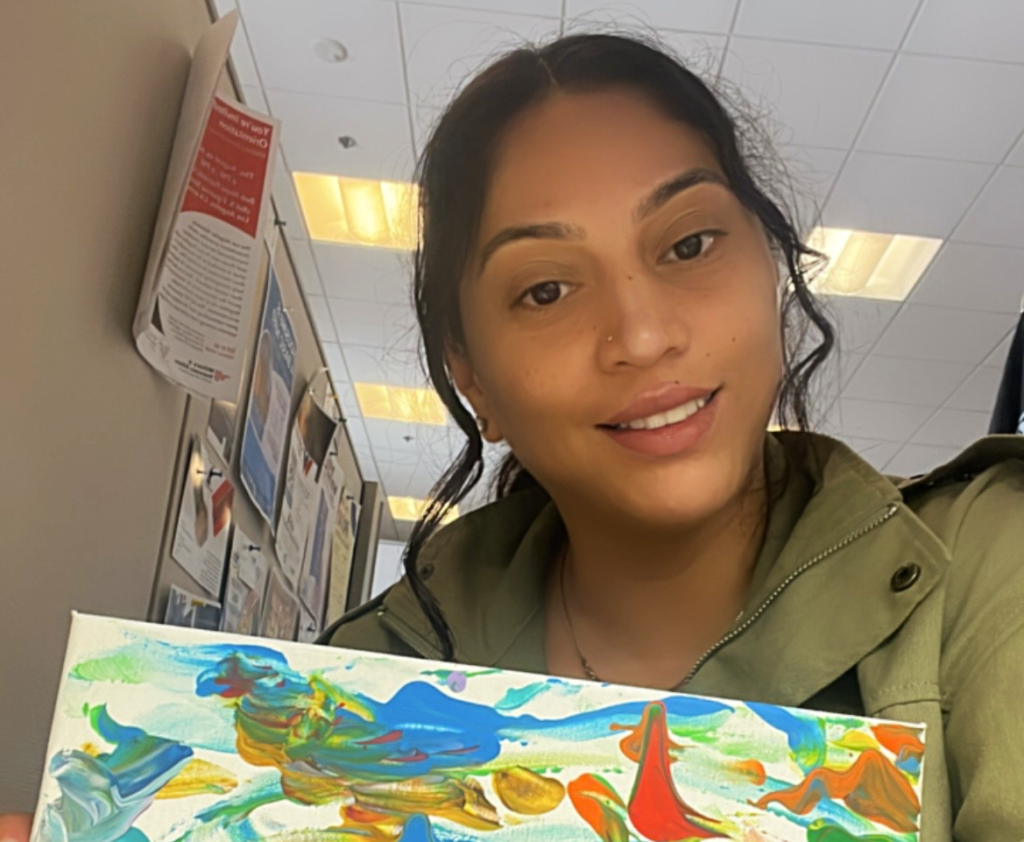
Veronica Hernandez sits at her desk facing a colorful painting of a waterfall. It was a gift from a U.S. Veteran she helped through her role as a peer support specialist with JVS SoCal’s Veteran Peer Access Network (VPAN) program.
Veronica knows what it’s like to serve her country and then make the often-difficult transition back to civilian life. She dreamed of serving in the military ever since she saw a television commercial featuring a man in uniform as a child. “I was like, ‘I want to be one of those,’” she says.
While others in high school were preparing for and applying to college, Veronica was on another path. At 15, she picked up a Marine Corps pamphlet and reached out, but she was told she was too young. At 17, the legal age to enroll, Veronica called a recruiter with whom she had previously spoken. “He said, ‘Enjoy your birthday and call me next week,’” she laughs. “I was just so eager!”
The next week, Veronica began her Marine Corps journey. It would include nine years of active duty and another three-and-a-half in the reserves. She was a radio operator and combat veteran (deployed twice to Iraq).
In 2017, when Veronica’s military career came to an end, she went to college for nursing. Working in the emergency room, however, brought back difficult memories of military combat as she helped patients who were hurt or had been shot. She knew that she needed a different environment in which she could thrive.
Shifting gears, Veronica completed her bachelor’s in health administration and landed a job with Wounded Heroes of America. She had found her niche. “I like helping my people,” she says. That’s when she started seeking opportunities to level up her support skills.
Veronica enrolled in the Vet2Peer Support Specialist training program at Loyola Marymount University (LMU), with which JVS SoCal is a partner agency. This training led her to her current role at JVS SoCal with the Veterans Peer Access Network team.
As a “Battle Buddy” (another name for Veteran Peer Support Specialists), Veronica empowers veterans and their family members to seek help for themselves. She serves an average of 20 each week, guiding them to access housing, transportation, childcare, employment and more.
Some of the people she has assisted include a veteran who was living on the streets of Los Angeles. He grew so desperate to find housing that he walked into a gas station and told the clerk to call the police because he was going to steal something. When the police arrived and wouldn’t arrest him, he threw a drink at an officer.
This veteran was ultimately connected to a rehab facility and to Veronica. He didn’t have identification, and getting it was complicated since he had been adopted from out of state. Veronica found him resources to get housed and a Veteran ID card so he could also get social security and California ID cards. A new birth certificate is now on the way, too.
Then, there’s the veteran who gave Veronica the artwork. He came from Florida to California seeking better resources. He was living at a train station with no money when he discovered VPAN. Veronica, who was at one point housing insecure herself, was able to help him learn about the many resources available to veterans. He was unaware that he might qualify for veterans’ compensation, so Veronica helped him submit a claim, plus get a California ID card and housing.
“From time to time, he stops by,” she says. “He’s an artist so he drew me this waterfall that’s hanging in my cubicle. I look at it every day and it reminds me how rewarding this role is.”
Do you want to contribute to Vanessa’s work empowering veterans? Spread the word about JVS SoCal’s Veterans First programs.